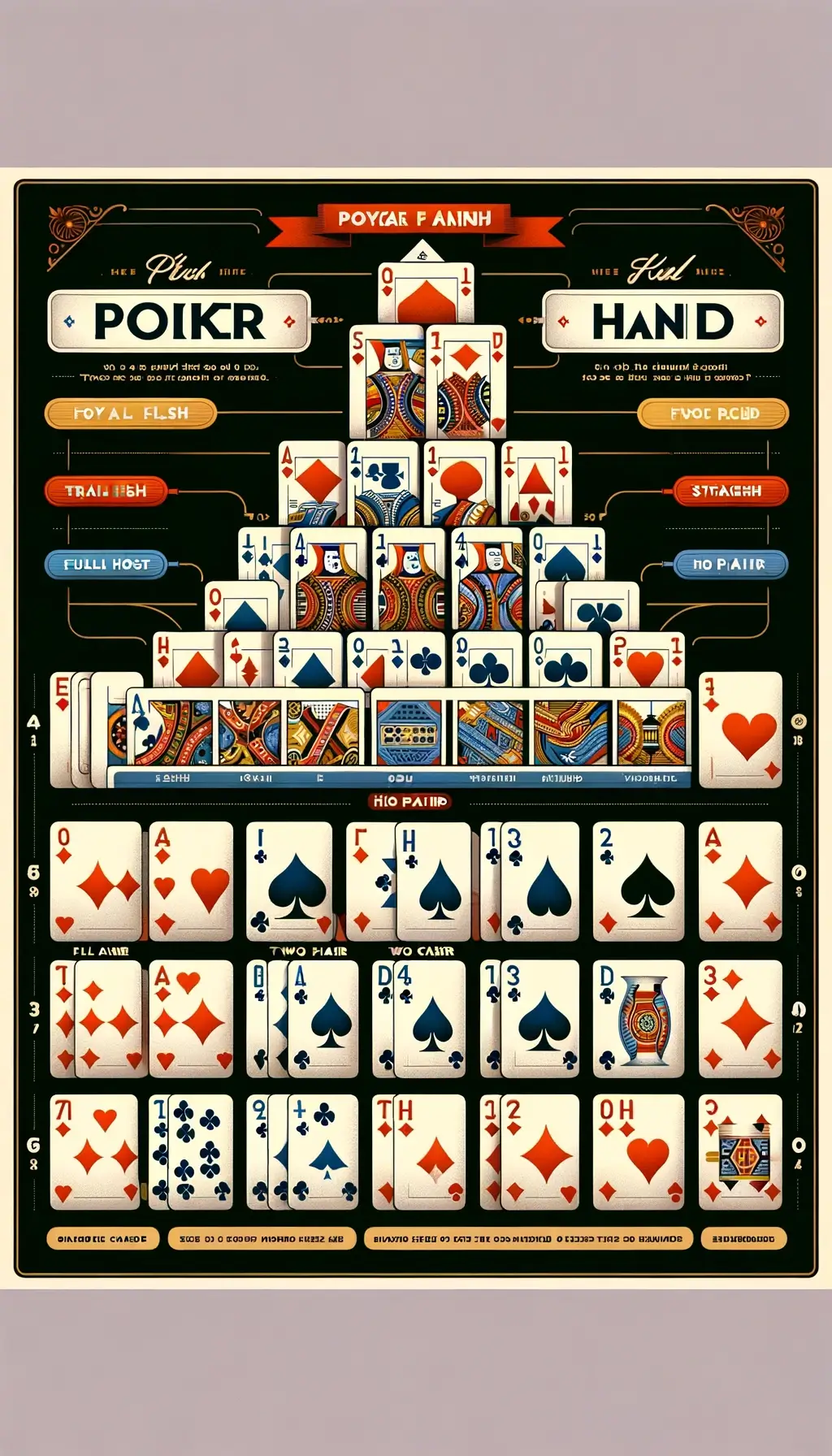Online poker has transformed the world of card games, bringing the excitement of poker to digital platforms accessible to millions around the globe. With its roots stretching back over two decades, online poker has grown exponentially, evolving into one of the most popular forms of online entertainment today. Its allure is not just in the thrill of the game itself but also in the opportunity it provides for players of all skill levels to engage in competitive play from the comfort of their own homes.
The appeal of online poker lies in its blend of strategy, skill, and a bit of luck, making each hand a dynamic challenge. Moreover, the availability of games around the clock and the potential to win real money add to its captivating nature. Whether it’s the dramatic all-ins of a high-stakes game or a friendly round at lower stakes, online poker offers something for everyone.
Section 1: Understanding the Basics of Poker
Before you dive into the vibrant world of online poker, it’s crucial to get a firm grasp of the fundamental aspects of the game. This includes understanding the different poker hand rankings and the basic rules that apply across most poker variants. Mastering these concepts will not only boost your confidence but will also enhance your decision-making skills at the poker table.
Poker Hand Rankings
Poker hand rankings are universal to most poker games and are essential to understanding which hand beats another in gameplay. Here are the poker hands ranked from highest to lowest:
- Royal Flush: The highest and rarest hand, consisting of the Ace, King, Queen, Jack, and Ten, all in the same suit.
- Straight Flush: Any five consecutive cards of the same suit, such as 5-6-7-8-9 of hearts.
- Four of a Kind: Four cards of the same rank, such as four Aces or four 9s.
- Full House: A combination of three cards of one rank and two cards of another rank, like three 7s and two Kings.
- Flush: Any five cards of the same suit, not necessarily in sequence.
- Straight: Five consecutive cards of different suits, such as 4 of hearts, 5 of clubs, 6 of spades, 7 of clubs, and 8 of diamonds.
- Three of a Kind: Three cards of the same rank, such as three Queens.
- Two Pair: Two different pairs of cards, like a pair of 8s and a pair of 3s.
- One Pair: Two cards of the same rank, such as two Aces.
- High Card: If no other hand is achieved, the highest card in your hand is your “high card”. In poker, the Ace is the highest card, while the 2 is the lowest.

Understanding these rankings is crucial as they form the basis of all poker games. Knowing what each hand consists of allows you to quickly assess your own hand, strategize based on the community cards (in games like Texas Hold’em), and determine your chances of winning.
Basic Rules of Poker
While there are many variations of poker, certain foundational rules apply across most formats:
- The Deal: Each player is dealt a set number of cards, depending on the variant of poker being played.
- Betting Rounds: Poker typically includes multiple rounds of betting. Players have options to bet, call (match the current bet), raise (increase the current bet), check (pass the action to the next player), or fold (withdraw from the hand), depending on the action that has taken place before them.
- The Showdown: After the final betting round, the remaining players reveal their cards. The player with the best hand, according to the hand rankings, wins the pot.
Blinds and Antes: Most poker games use blinds or antes to initiate betting. Blinds are mandatory bets made by two players to the left of the dealer in games like Texas Hold’em and Omaha, while antes are small, required bets made by all players at the table in other variants.
These basic rules provide the framework within which all poker games are played. As you become more familiar with poker, you’ll learn how these rules apply specifically to different types of games and develop strategies that can significantly influence your success at the tables.
Section 2: Choosing the Right Online Poker Site
Selecting an online poker site is one of the first critical decisions you will make as a beginner. The right platform can significantly enhance your learning experience, offering a supportive environment to develop your skills. Here’s what to consider when choosing a site and a few recommendations that are known for being beginner-friendly.
Factors to Consider
- Security: The importance of playing on a secure site cannot be overstated. Look for sites that use advanced encryption methods to protect your personal and financial information. It’s also vital to choose sites that are licensed and regulated by reputable gaming authorities.
- User Interface: A user-friendly interface is crucial for beginners. The site should be easy to navigate, with clear and simple controls and a well-organized lobby so you can find games easily. Responsive design, meaning the site works well on both desktop and mobile devices, is also a plus.
- Game Variety: As a beginner, you may want to try different types of poker games to find the one that suits you best. Look for sites offering a broad range of games, from popular variants like Texas Hold’em and Omaha to more niche games like Razz or Seven Card Stud.
- Stakes: Starting with low-stakes games is advisable as you learn the ropes. The right site should offer games at various stakes levels, including micro-stakes, allowing you to play for pennies. This can reduce the stress of losing large amounts of money as you learn.
- Bonuses: Many sites offer bonuses such as welcome bonuses, deposit matches, and freerolls (free-to-enter tournaments with real money prizes). These can provide extra value and extend your playtime. Be sure to read the terms and conditions associated with these offers to ensure they’re beneficial.
- Support: Good customer support can be invaluable, especially for newcomers who may have questions or encounter issues. Look for sites with a reputation for responsive and helpful customer service, ideally available 24/7 via multiple channels like live chat, email, and phone.
Recommended Sites for Beginners
- PokerStars: Known for its vast selection of games and tournaments, PokerStars also offers comprehensive tutorials and free-to-play games, which are ideal for beginners.
- 888poker: This site is celebrated for its user-friendly software and excellent customer support. It also provides a variety of beginner tables and a no-deposit bonus that lets new players start without risking their own money.
- PartyPoker: PartyPoker has a long-standing reputation for quality and offers beginner-friendly games, including low-stakes tables and free rolls, making it a great starting point for novices.
- BetOnline: While it caters to players of all skill levels, BetOnline is particularly accommodating to beginners with its straightforward platform and wide range of stake levels.
Choosing the right online poker site is a blend of finding where you feel comfortable, what meets your needs, and what opportunities allow you to grow as a poker player. Each of the sites listed above offers a unique set of features aimed at helping new players get settled into the exciting world of online poker.
Section 3: Setting Up Your Account
Once you’ve chosen an online poker site that fits your needs, the next step is to set up your account. This process involves registering and verifying your identity, followed by depositing funds to start playing. Here’s a step-by-step guide to help you through the process smoothly and securely.
Registration Process
- Visit the Site: Navigate to the homepage of the online poker site you’ve chosen.
- Sign Up: Look for a “Join Now” or “Register” button, usually prominently displayed on the site’s homepage.
- Enter Your Details: You will be asked to provide personal information such as your name, date of birth, address, email address, and possibly a username and password. Ensure that all information is accurate to avoid issues with account verification later.
- Accept Terms and Conditions: Read through the site’s terms of service and privacy policy. You must accept these to proceed with your account setup.
- Verify Your Email: Most sites will send you an email to confirm your address. Click the link in this email to activate your account.
- ID Verification: To comply with gaming regulations, you may be required to verify your identity by submitting documents such as a passport, driver’s license, or a recent utility bill. This step is crucial for ensuring the security of your account and enabling withdrawals.
Depositing Funds
- Log In to Your Account: Once your account is set up and verified, log in using your chosen credentials.
- Navigate to the Cashier: This section is typically labeled “Cashier,” “Banking,” or something similar, and can be found in the site’s lobby or menu.
- Select a Deposit Method: Choose a deposit method that suits your needs. Common options include credit/debit cards, e-wallets (like PayPal, Skrill, or Neteller), bank transfers, or even cryptocurrencies on some sites.
- Enter Deposit Amount: Decide how much money you want to deposit. Remember to start small, especially if you’re a beginner.
- Set Deposit Limits: Many sites allow you to set daily, weekly, or monthly deposit limits. This is a crucial feature for responsible gaming, helping you manage your gambling budget and prevent excessive spending.
- Confirm the Transaction: Follow the instructions to confirm your deposit. Funds typically appear in your account almost immediately, depending on the method.
- Claim Any Bonuses: If you’re eligible for a welcome bonus or any other promotions, make sure to claim these when making your deposit. Sometimes, you may need to enter a promo code.
Tips for Safe Transactions
- Use Secure Networks: When making transactions, ensure you are using a secure, private WiFi network.
- Monitor Your Account: Regularly check your account statements and transaction history for any unauthorized activity.
- Understand Withdrawal Policies: Familiarize yourself with the site’s withdrawal policies, including minimum withdrawal limits and processing times.
By following these steps, you can ensure that your entry into the world of online poker is as smooth and secure as possible. Setting up your account properly not only gives you access to the games but also ensures that you are playing safely and responsibly.
Section 4: Learning Popular Poker Variants
Once you’ve set up your online poker account, the next step is to familiarize yourself with various poker games. Different variants offer unique rules and challenges, making the game of poker endlessly engaging. Below, we delve into some of the most popular poker variants, focusing on Texas Hold’em and Omaha, and briefly touch on other games like Seven Card Stud and Razz.
Texas Hold’em
Rules and Gameplay: Texas Hold’em is arguably the most popular poker variant and a great starting point for beginners. The game begins with each player receiving two private cards (known as ‘hole cards’). Five community cards are then dealt face-up on the ‘board’. The game unfolds over four betting rounds: pre-flop, flop, turn, and river. Players aim to make the best five-card hand using any combination of their two-hole cards and the five community cards.
Why It’s Good for Beginners: Texas Hold’em is relatively simple to learn but offers a depth of strategy that keeps it challenging and interesting. The availability of extensive resources, from books to online tutorials, makes it easier for beginners to learn the ropes. Furthermore, its popularity means that there are always games available at all stake levels.
Omaha
- Differences from Texas Hold’em: While Omaha poker shares many rules with Texas Hold’em, including the use of five community cards dealt in three stages, the key difference lies in the hole cards. In Omaha, players are dealt four-hole cards and must use exactly two of them in combination with three of the community cards to make their hand.
- Basic Strategies: Omaha is known for generating strong hands more frequently, which shifts the strategy towards playing more drawing hands (hands that need additional cards to become strong). It’s crucial to be selective with starting hands, focusing on those that can make the nuts (the best possible hand) and are well-coordinated (have the potential to make flushes, straights, or full houses).
Other Variants
- Seven Card Stud: Before the rise of Texas Hold’em, Seven Card Stud was the most popular poker game. Players receive seven cards throughout the hand—three face down and four face up—intending to make the best five-card poker hand. There are no community cards in Seven Card Stud.
- Razz: A variant of Seven Card Stud, Razz is a ‘lowball’ game where the objective is to make the lowest possible hand. Unlike in most poker games, flushes and straights do not count against the players, and the ace is always low.
These poker variants each offer a unique twist on standard poker rules, providing a diverse and rich playing experience. For beginners, starting with Texas Hold’em is advisable due to its straightforward gameplay and abundance of educational resources. As you gain more experience, exploring other games like Omaha, Seven Card Stud, and Razz can expand your skills and understanding of different strategic aspects of poker.
Section 5: Strategies for Beginners
Developing effective strategies is essential for any poker player, especially beginners. Understanding the basics of position, starting hands, betting strategies and bankroll management can provide a solid foundation for successful poker play. Here’s a breakdown of these crucial elements.
Understanding Position and Starting Hands
Importance of Position: In poker, your position (where you are seated about the dealer) can significantly affect your gameplay. Being in a ‘late’ position (acting after most other players) is advantageous as it allows you to make more informed decisions based on the actions of your opponents. Conversely, an ‘early’ position requires more caution since many players will act after you.
What Hands to Play: As a beginner, playing too many hands can be a pitfall. Focus on playing strong starting hands that have the best chance of forming a winning poker hand post-flop. Examples of strong starting hands include high pairs (like Aces, Kings, and Queens), high-suited connectors (like Ace-King of the same suit), and other hands that have the potential to make straights or flushes.
Basic Betting Strategies
How and When to Bet: Betting is not just about the cards you hold but also about the situation at the table. A bet can be a bluff, a semi-bluff (where you have a drawing hand that could improve), or for value (where you believe you have the best hand). Knowing when to bet is as crucial as knowing how much to bet.
Folding, Calling, and Raising:
- Fold when you believe your hand isn’t strong enough to win or when the risk of a higher bet isn’t worth continuing.
- Call to match the current bet if you believe your hand has the potential to improve or if you suspect an opponent may be bluffing.
- Raise to increase the stakes, either as a bluff to force others to fold or when you have a strong hand and want to increase the pot value.
Bankroll Management
Managing your money wisely ensures that you can continue playing and improving without risking financial strain.
Set a Budget: Decide on an amount you are comfortable losing and stick to it.
- Avoid Chasing Losses: If you have a bad session, don’t play higher stakes to try to win it back quickly.
- Play Within Your Limits: Stick to stakes that your bankroll can support, usually where you can afford to buy into a game with at least 20-30 times the buy-in.
Section 6: Practicing Your Skills
Practical experience is vital for applying and refining the strategies you learn. Here’s how to gain experience without significant risks.
Free Play Options
Many online poker sites offer free play or demo modes. These platforms allow you to practice without risking real money, providing an excellent opportunity to experiment with different strategies, understand the mechanics of the game, and improve your decision-making skills without financial pressure.
Low-Stakes Games
Starting with low-stakes games is another effective strategy for new players. These games reduce financial risk and stress, allowing you to focus on learning the game and practicing your strategies. They also tend to be less competitive, offering a more forgiving environment for beginners.
Both free-play options and low-stakes games are invaluable resources for beginners. They provide a practical and low-risk way to translate theoretical knowledge into effective poker-playing strategies, helping you build confidence and experience as you progress in your poker journey.
Section 7: Improving Your Game
As you become more familiar with the basics of poker, the next step is to continuously improve your game. This involves utilizing learning resources and analyzing your play to refine strategies and correct mistakes. Here’s how you can elevate your poker skills to the next level.
Learning Resources
- Books: Countless poker books cater to players of all skill levels. Classics like “The Theory of Poker” by David Sklansky and “Harrington on Hold’em” by Dan Harrington provide comprehensive strategies and insights into playing winning poker.
- Online Tutorials: Many websites and poker coaching sites offer video tutorials and courses ranging from beginner to advanced levels. These resources are often created by professional players who share their experiences and tips, which can be particularly helpful for visual learners.
- Forums: Poker forums like TwoPlusTwo and CardsChat allow you to interact with other poker players, discuss strategies, and share experiences. Engaging with a community can provide support and deeper insights into the game dynamics.
Analyzing Your Play
- Poker Tracking Software: Tools like PokerTracker and Hold’em Manager track all the hands you play online, providing detailed statistics about your game and your opponents. Analyzing this data can help identify patterns in your play, highlight your strengths, and pinpoint areas for improvement.
- Review Sessions: Regularly reviewing your play is crucial. Look back at key hands and decisions to understand what you did well and what could be improved. Consider discussing these sessions with more experienced players or coaches who can provide objective feedback and advice.
Section 8: Online Poker Etiquette
Good manners are just as important online as they are in live games. Understanding and adhering to online poker etiquette not only enhances the playing experience for everyone involved but also helps maintain a respectful and enjoyable gaming environment.
Rules of Conduct
Respect for fellow players is fundamental. Avoid berating or criticizing the play of others, as this can create a negative atmosphere. Also, it’s important to play at a reasonable speed and not intentionally slow down the game. If you need to leave, it’s courteous to sit out or leave the table rather than make players wait.
Chat Functionality
Using Chat Responsibly: The chat feature in online poker should be used to enhance the game, not detract from it. Avoid using the chat to give away information about your hand, discuss a hand in progress, or collude with other players.
Common Poker Chat Terms: Familiarize yourself with common chat phrases like “gg” (good game), “nh” (nice hand), and “vnh” (very nice hand). Understanding these terms can help you communicate more effectively and contribute to a friendly game environment.
By continuously learning and analyzing your play, you can advance your poker skills significantly. Moreover, practicing good online poker etiquette ensures a respectful and enjoyable environment for all players involved.











